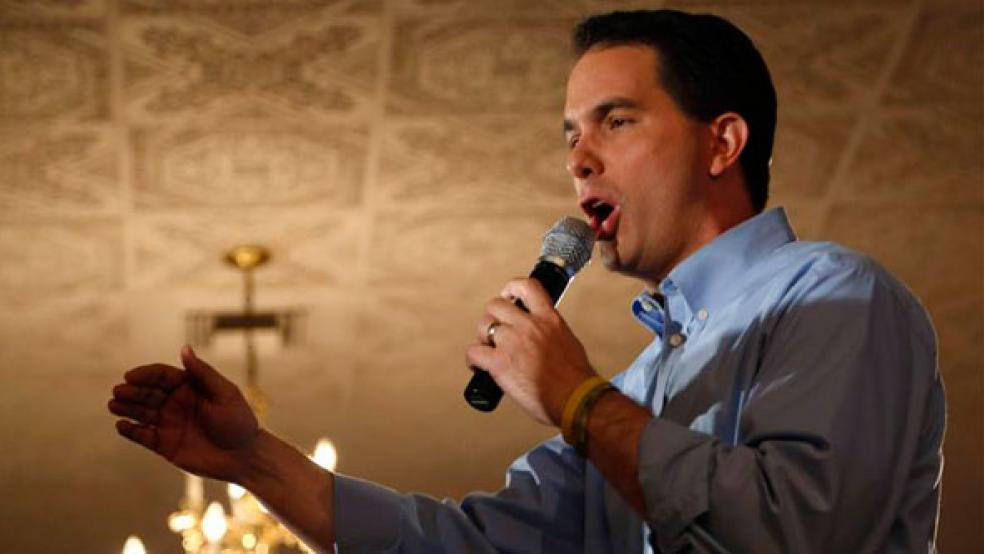As Chris Christie gets tangled in the cables over “Bridgegate,” another GOP governor’s star is rising.
Scott Walker of Wisconsin has the pedigree of a fiscal conservative, someone capable of balancing his state budget after limiting collective bargaining rights for public employees. The unions fought back with a recall petition. But Walker won his governorship - again.
Walker’s two-time win in Wisconsin could propel him to take a shot at the 2016 presidential election, which now seems wide open for the GOP.
Related: Chris Christie in a New Jam Over Bridgegate
Late Friday, former Christie associate David Wildstein claimed in a letter from his lawyer that Gov. Christie, contrary to the governor’s vehement claims in a press conference several weeks ago, knew of the George Washington Bridge lane closures in Fort Lee as they were occurring. Wildstein’s lawyer says he has evidence to prove these charges, though he has not yet produced it.
Christie acknowledges that he learned about the bridge lane closings as they were happening when the press reported on the massive traffic jam. But he denied any suggestion of prior knowledge.
No matter how this latest imbroglio ends up playing out for Christie, the door has opened for a spate of other 2016 presidential candidates, including Scott Walker. Currently up for reelection as governor in Wisconsin, Walker is leading his challenger, Mary Burke, by a 6-percent margin, 47 to 41, according to a new poll in his state.
Related: How Scott Walker Would Reform the GOP
Though Walker has the forward momentum, name recognition and other benefits of the incumbency, the Wisconsin horse race has really only begun and it’s too soon to predict its trajectory. But Walker – currently one of 30 Republican governors in the country – has some important bragging rights.
In 2010 he won the governorship by six percentage points and then went on to survive a tough recall election in 2012 by an even higher share of the vote – the first American governor in history to survive a recall attempt. That launched his national reputation, while his fiscal reforms and tough stance against collective bargaining rights to fix a $3.6 billion budget deficit further burnished his conservative Republican credentials.
Other prominent Republicans are also viewed as potential 2016 candidates, of course – among them Paul Ryan, Marco Rubio, Jeb Bush, and John Kasich. In a recent Washington Post-ABC News poll, Ryan of Wisconsin – the House budget chairman and fellow Walker cheesehead – emerged as the top choice of Republicans and GOP-leaning independents for the 2016 nomination, with 20 percent, followed by Jeb Bush at 18 percent and Chris Christie at 13 percent.
But most analysts maintain that at this early juncture, the GOP race is wide open, and if Christie falls out of the running, anything could happen.
Related: Christie Scandal Opens the Door to Far-Right GOP Hopefuls
Walker, for his part, says those outside the Washington establishment stand the best chance of reforming a bloated and out-of-control federal government. “Outsiders have a benefit,” he said in a recent interview. “Republican [governors] have had success because we’re reformers, optimistic, relevant. To take on the monumental challenges of the federal government, I think Americans want to see proven reformers in there to shake things up.”
In addition to standing up to the unions in the name of fiscal reform, Walker passed legislation to prevent voter fraud by requiring photo ID at the polls; he blocked funding for Planned Parenthood and signed legislation prohibiting health plans offered through the exchanges in Wisconsin from covering abortion; and he enhanced Second Amendment rights – “transforming Wisconsin from one of the more restrictive to one of the freest states in the union when it comes to the right to bear arms,” as he wrote in his 2013 book, Untimidated: A Governor’s Story and a Nation’s Challenge.
Walker has also steadfastly maintained that 2014 is the year that matters most to Republicans.
“If I succeed again in 2014, it will send a powerful message to governors of both parties and to mayors as well,” he said in an interview in mid-December. “Nationally, it’s not enough for Republicans to hold the House of Representatives. We have a big opportunity to regain the U.S. Senate. Then, two years later, it makes for a compelling case that we can complete the reforms by putting a new chief executive in the White House.”
Top Reads from The Fiscal Times:





